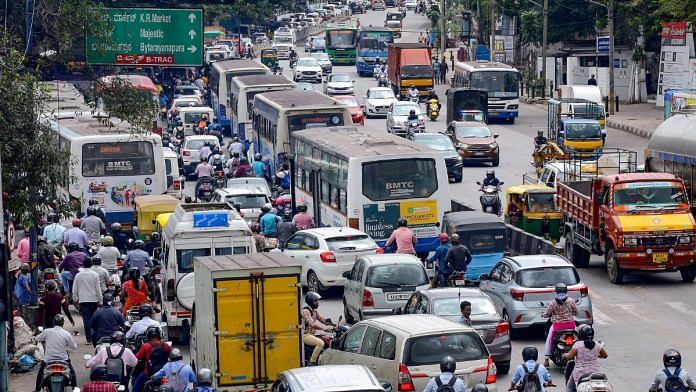Bengaluru: In view of the increasing civic problems in Bengaluru and neighbouring states rolling out the red carpet for IT companies, the Karnataka government is reviving a committee, headed by a cabinet minister, to engage with IT companies and other corporations to address concerns faced by the city’s significant white-collar workforce, ThePrint has learnt.
The committee, which has been lying dormant for over a year, has been given the green light after considerable public backlash over traffic and water logging in recent weeks.
“It (committee) was actually formed a year ago. But it was not activated because the Dy chief minister thought it could be done later. But with all the backlash, the process has been asked to be expedited,” said a source with direct knowledge of the developments.
The committee is likely to be headed by Information Technology and Biotechnology minister Priyank Kharge and will include other members, like Prashanth Prakash, partner in Accel (a global venture capital firm) and chairperson of Karnataka’s vision group on startups.
When the committee was formed, the chief commissioner of the now defunct Bruhat Bengaluru Mahanagara Palike (BBMP, the city’s civic body) was also a member. But since the BBMP has been replaced with the Greater Bengaluru Authority, some changes are likely to be made to the composition of the committee.
The committee will reach out to companies in Peenya, Manyata Tech Park, ORR (Outer Ring Road), ORRCA (Outer Ring Road Companies Association), Bagmane and others.
Frequent flooding or waterlogging, potholes, delays in completion of public infrastructure and mass transit projects, has led to bigger traffic jams and a general decline in the quality of life in India’s IT capital.
Although other major urban centres across India face similar challenges, the problems in Bengaluru have received more attention.
D.K. Shivakumar, the Deputy CM and Bengaluru incharge minister’s statements, equating demands for better infrastructure with blackmail did not go down well.
“The objective of this committee is to go to them, talk to them, and what do they need, last mile connectivity, digital infrastructure, civic amenities, power, water… treat everything like a brown field,” the person cited above said, requesting anonymity.
Issues of traffic and potholes raised by the chief executive of a startup, Blackbuck, fuelled the latest round of backlash from all quarters, including the city’s 14 million residents who accuse the Siddaramaiah-led government of prioritising big-ticket projects while overlooking basic infrastructure.
‘Left red-faced’
Chief Minister Siddaramaiah’s request to Wipro founder Azim Premji to allow traffic through the Wipro campus to decongest the Outer Ring Road has also been turned down.
Premji cited legal and statutory challenges to the proposal.
“That apart, it will also be appreciated that our Sarjapur campus is a SEZ providing services to global customers, our contractual conditions mandate stringent, non-negotiable access control norms for governance and compliance. Moreover, public vehicular movement through private property would not be effective as a sustainable, long-term solution,” Mr Premji said.
According to people aware of the developments, the CMO did not consult his deputy or the IT department before writing to Azim Premji, the founder of Wipro.
“Maybe someone thought it was better if the CM did it directly without informing the DyCM. Now both of them have been left red-faced,” said another person, also requesting anonymity.
Bengaluru prides itself as India’s IT capital, startup and innovation hub and knowledge centre. But in recent years, these positive references have been replaced by criticism of its poor civic amenities.
According to a 2023 report by ORRCA, the traffic mess in ORR costs the city about $15 billion annually.
To fix this, and control the unregulated growth of Bengaluru, the BBMP was replaced with the GBA earlier this year with the promise of more streamlined services and to help rid the city of its infrastructure challenges.
But the rains have exposed the fault lines.
‘All issues will be resolved soon’
Karnataka chief secretary Shalini Rajneesh chaired a meeting that was attended by Biocon chief Kiran Mazumdar Shaw, Yulu founder R.K. Mishra and urban designer Naresh Narasimhan among others.
Ideas such as congestion charges for single-occupancy cars in high density corridors, including the ORR, and a 90-day plan to fix Bengaluru’s teething problems were discussed.
Basavaraj Rayareddi, senior Congress leader and economic adviser to the CM, told ThePrint that all measures to decongest Bengaluru are being deliberated upon. “In the first week of October, the CM has called a meeting to review the GBA’s work. Hopefully everything will be resolved within a month’s time,” he said.
But the focus on big ticket projects by Shivakumar, including the Tunnel Road and the double-decker flyover, experts say, will continue to encourage private vehicle usage in the city.
In just one financial year (2024-25), nearly 8 lakh new vehicles were added to Bengaluru’s already congested roads. This included nearly 5 lakh two-wheelers and 1.5 lakh four-wheelers, taking the total number of vehicles to over 1.2 crores which is just as much as its population.
Experts say that the double-decker road, or Shivakumar’s other pet project, the Rs 40,000 crore tunnel road will not help. “The way decision making is (in government), I don’t think they are interested in scientific data or result-based decision-making. All these projects and what they are trying to do, doesn’t really have a scientific basis,” Professor Ashish Verma from the IISc Sustainable Transportation Lab, earlier told ThePrint.
(Edited by Viny Mishra)
Also read: Will a double-decker flyover help solve Bengaluru’s traffic woes or fuel another problem





